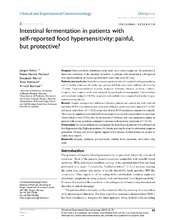| dc.description.abstract | Purpose: Enterometabolic disturbances may cause meal-related symptoms. We performed a functional evaluation of the intestinal microflora in patients with unexplained, self-reported food hypersensitivity by measuring fecal short-chain fatty acids (SCFAs). Patients and methods: Thirty-five consecutive patients with self-reported food hypersensitivity and 15 healthy volunteers of similar age, gender, and body mass index collected all feces for 72 hours. Fecal concentrations of acetic, propionic, n-butyric, i-butyric, n-valeric, i-valeric, n-caproic, and i-caproic acids were analyzed by gas-liquid chromatography. Concentrations and excretions (output) of SCFAs in patients and controls were compared and related to gastrointestinal symptoms. Results: Despite nonsignificant differences between patients and controls for both total and individual SCFA concentrations and excretions, n-butyric acid comprised a higher (P = 0.035) and acetic acid a lower (P = 0.012) proportion of total SCFA in patients compared to controls. There were no significant correlations between symptom scores and concentrations or excretions of individual or total SCFAs, but the proportion of n-butyric acid was significantly higher in patients with severe symptoms compared to patients with moderate symptoms (P = 0.016). Conclusion: The results indicate an enterometabolic disturbance in patients with self-reported food hypersensitivity. Higher proportions of n-butyric acid may be related to abdominal symptom generation, but may also protect against organic bowel disease. Further studies are needed to clarify these aspects. | en_US |
